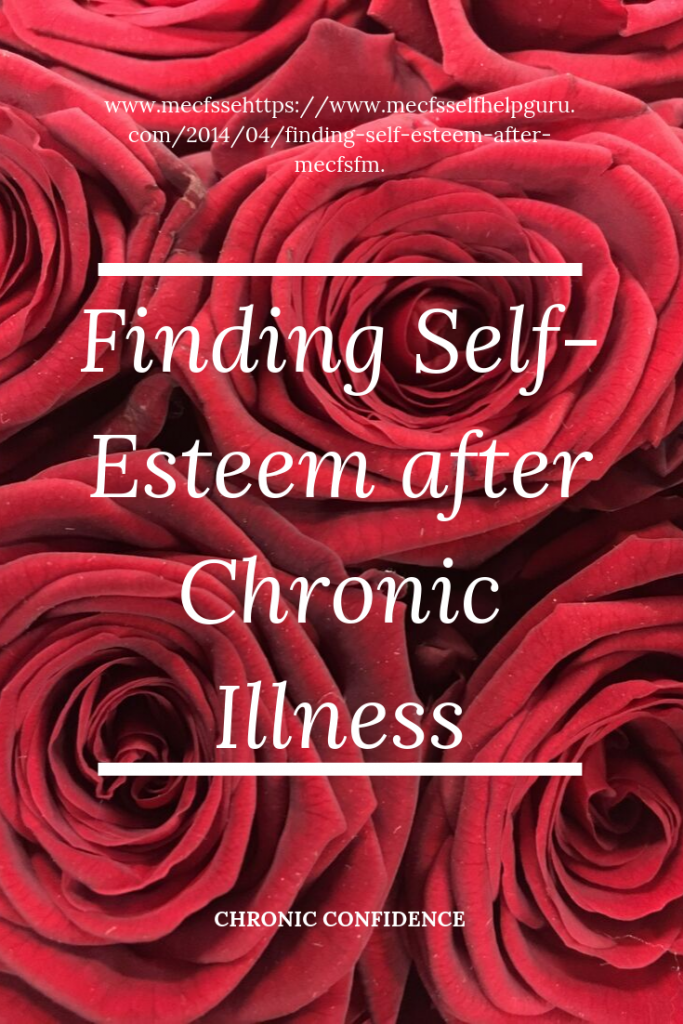For many of us, our self-esteem is very tied up with what we do and what we are capable of. How we perform in our job, or the role that we take in our family or with friends, or even being good at a hobby or a sport all contribute to the positive feelings we experience about who we think we are. Then along comes chronic illness and wipes our ability to perform in these areas clear away. What then? We can no longer say I’m good at this and in these situations this is how I am, because generally we can’t even put ourselves in those situations. Because of our illness we rarely get the opportunity to do the things that make us feel good about ourselves so it’s not surprising that our self-esteem can take a bit of a knock.
One of the strategies I used to deal with this was to set myself the challenge of learning how to deal with living with this illness. If nothing else maybe I could see myself as somebody who dealt well with a difficult life event. However, this strategy still wasn’t great because there are so many things you can’t control about this illness. At first, I would regularly fall into the trap of seeing a set-back or feeling fed-up or low as a personal failure.
I was lucky that I had already faced a challenge that had taught me my unconditional value. I had already learnt that I didn’t have to do to be worthwhile it was enough to just be. Some people are brought up with a sense of unconditional self-worth but for those who aren’t it can be a difficult thing to learn without appropriate support. For some this support can come in the form of a spiritual teacher, others find therapy, coaching or some other form of personal development can help them discover the unconditional nature of their worth.
However, even with a background of self-acceptance and valuing ourselves for just being, the inability to express ourselves in the ways that we were used to, still leaves us with an absence of opportunities to experience good feelings about who we are.
For me it was important to remember that I am still the same essential me, it’s just my ability to express myself that has changed. I set myself the goal of learning to express myself in new low energy ways. I had to remind myself that I had developed habits of self-expression that involved a lot of energy but they didn’t represent the whole me. I had to learn to reconnect with other aspects of myself that had been obscured by the energetic me. You can find out about strategies for this kind of reconnection in another post I have written about ‘taking the time to find out who you really are’. I also talk about coping with our inability to be productive in another related post.
Finally, another practice that has enabled me to regularly experience good feelings about myself is that of cultivating an attitude of loving kindness to others. Loving kindness doesn’t have to be actively expressed. Thinking positively about others and silently wishing them well makes a difference in terms of how comfortable it is for others to be around you, and also to your own sense of emotional well-being. I describe a meditation practice aimed at cultivating this attitude in this post.
What can still give you an experience of feeling good about yourself? How can you make this a more regular part of your life?
A small favour, could you please rate this article using the stars below the related posts. Thank you!






Well put. I did some research for a university degree in a past life into multi-sensory rooms. No actual research on them to quote ( you are not allowed to have your own ideas at Uni) but did come across quite a bit of research into Time to Be. This was so important with deaf-blind kids who were having to meet targets the whole day, but staff found taking the reins off difficult. With ME, you have lots of time to be, and can encourage others to do so.
As for self-esteem, we are identified by our work. I took great delight in telling people ( aged 48) that I was a pensioner, then later a paper girl. (did the Sunday papers) Be proud of whatever you achieve, even if this is just sitting up in bed, and delight in small things.